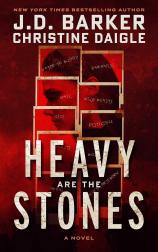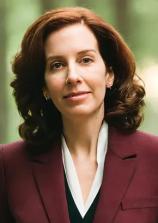Interview: December 5, 2024
Facing the truth can be deadlier than facing the killer in J.D. Barker and Christine Daigle’s newly released thriller, HEAVY ARE THE STONES. In this interview conducted by Bookreporter reviewer Ray Palen, Barker talks about the importance of covering serial killers and how they operate, the major contribution that his co-author made to the novel, the religious motifs in the story and what they are meant to symbolize, the significance of the book’s title, and the exciting project that he and Daigle are currently working on.
Question: HEAVY ARE THE STONES opens with quotes from Ted Bundy and John Wayne Gacy. There has been some backlash surrounding the coverage of serial killers. Many are convinced that streaming series like “DAHMER” and “Monster” glorify them. On the flip side, there are those who believe that we need to know and understand the enemy to be better prepared for them. What do you think about this?
J.D. Barker: Maybe it’s because I’m getting older, but personally, I feel we need to talk about these things. If we don’t, we won’t learn from them. “DAHMER” (the series) is a great example. It’s difficult to watch, but looking back on it, studying it, you not only see the monster that he was, but you see how society failed to catch him early. The warning signs were all there. Putting a spotlight on society’s worst doesn’t glorify them; it helps us prevent the next one.
Q: In addition to your solo writing, you have collaborated with authors like James Patterson and Dacre Stoker. Now you have paired up with clinical neuropsychologist Christine Daigle. What contribution did she make to the book, and do you have a particular method when you work with other writers?
JDB: I started my writing career working as a book doctor and ghostwriter, so I’m no stranger to collaborations. I love working with others. Christine is a great example. As a neuropsychologist, she brings experiences and a skill set to the table that I simply do not have. I could Google and research and learn enough to be believable on the page, but having someone like her on a project brings a unique authenticity to the writing. While her talent was evident in writing samples, she had never written a thriller before. That’s where I come in.
My work with coauthors is very much a mentorship. I seek out raw talent and teach them how to channel that into a page-turner. Together, we generate the idea, write the outline and craft the novel. At the end of the process, my coauthor has had a crash course in writing, and we’ve created a book neither of us could have written on our own.
Q: In HEAVY ARE THE STONES, we get to watch the deadly exploits of Leviticus and Azrael. Many serial killers use religious names and incorporate symbols into their murders, which always seems to add an extra layer of horror to them. What is the importance of the religious motifs in this story, and what are they meant to symbolize?
JDB: In many ways, religious texts represent our original fears. A baseline. I’ve read more horror novels than I can count, but none have scared me more than Revelations in the Bible. Putting on my psychologist hat, these stories may hit home because most of us hear them at a very early age. We have to be 17 years old to watch a scary R-rated movie, but I first heard the horrific tale of people being turned into pillars of salt during Sunday school when I was six. I’m not a particularly religious person; I’m smart enough to know that there’s a lot I don’t know. And with that mentality comes an open mind. Religion has the power to bring us together as a group. That can be both good and bad. In this novel, we explore how that power can be abused when it’s controlled by the wrong person.
Q: The fact that Azrael continues to kill because the police and governor do not honor his demands to release Leviticus from prison will give readers a lot to think about. Did you base this predicament on a real-life occurrence, or was this plot device your own?
JDB: When crafting a thriller, it’s all about the ticking clock. I charged Christine with coming up with the ticking clock for this title, and she did not disappoint. To the best of my knowledge, nothing like this has ever happened before, but that doesn’t mean it couldn’t. The most frightening aspect of the book is the fact that it could happen. The technology exists today.
Q: Detective Jena Campbell is my favorite character in the book. She feels intense guilt over the victims dying in succession. Do you think her guilt is warranted, or are we to believe that Azrael’s killing spree was so well conceived that nothing could have prevented it?
JDB: I think Jena does everything in her power to stop Azrael once the ball gets rolling, but the fact that none of it would have happened if she hadn’t made a mistake years earlier weighs heavy on her.
Q: Other than the fact that Leviticus stoned his victims to death, how did you come up with the book’s title? I have a feeling that there is some additional symbolism attached to this terrific title.
JDB: The title was inspired not only by wanting to capture the feel of Biblical language but also by the heavy burden Jena carries. It reflects the weight of the truth she’s hiding about what she did to stop the killer. Throughout the book, the language and symbolism of carrying burdens are woven in, mirroring Jena’s struggle between upholding the heroic legacy she’s built in Pittsburgh and the personal cost of coming forward with the truth --- a choice that would shatter her career and reputation.
Q: Will HEAVY ARE THE STONES be a stand-alone, or might there be other thrillers featuring Jena Campbell? What are you currently working on?
JDB: Jena is quickly amassing quite the following. I have a feeling we’ll revisit her at some point down the road. Christine and I are currently knee-deep in another project. Do you remember a movie from the ’90s called Flatliners? It’s an intriguing and frightening story about medical students who bring each other to the brink of death in an attempt to learn what comes next. It starred Kiefer Sutherland, Julia Roberts, Billy Baldwin, Oliver Platt and Kevin Bacon. The movie is a personal favorite of mine; it’s one of those films I’ve watched repeatedly over the years. Christine and I are writing a novel to reboot the franchise, tentatively titled Flatliners: Resurrection.





